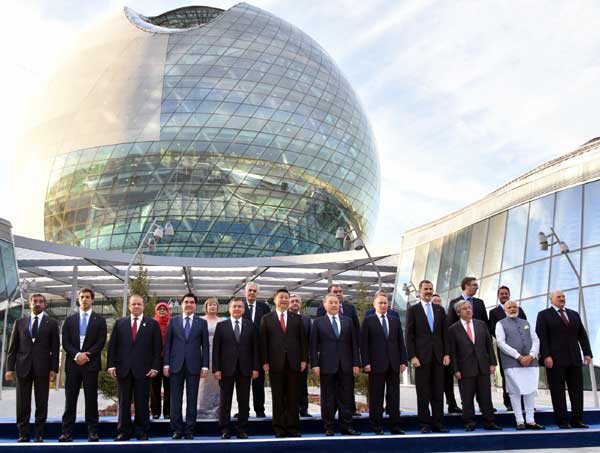
Prime Minister Narendra Modi and other leaders of SCO Family, at the inauguration of the Astana EXPO-2017 in Astana, Kazakhstan
After a two-year process, India and Pakistan became full members of the Shanghai Cooperation Organisation (SCO) on June 9, 2017.
India’s membership was strongly pushed by Russia while Pakistan’s entry into the grouping was backed by China. With the expansion, the SCO will now represent over 2/5 of the world’s population and nearly 1/5 of the global economy.
India and Pakistan are the seventh and eighth members of the SCO after China, Kazakhstan, Kyrgyzstan, Russia, Tajikistan, and Uzbekistan. India was admitted into the SCO as an observer at the 2005 Astana Summit along with Iran and Pakistan.
The SCO as a regional organisation has evolved as a forum for debate and discussion on security and economic issues in the post–9/11 environment, as growing ethnic nationalism and Islamic fundamentalism emerged as major causes of concern for Russia, China and Central Asian states. According to Harsh V. Pant, Professor of international relations in the Defence Studies Department and the India Institute at King’s College London, the SCO has served for them as a means to keep control of Central Asia and limit American influence in the region. Beyond that, however, it has not been able to accomplish much so far.
India’s growing interests in Central Asia are well-recognized by SCO members. For India, therefore, membership of the SCO is primarily its gateway to Central Asia. SCO would help India in terms of connectivity and economic and counter-terror cooperation with the Eurasian bloc. India’s Prime Minister Narendra Modi, in a statement before his departure for Astana, said, “I look forward to deepening India’s association with the SCO which will help us in economic, connectivity and counter-terrorism cooperation, among other things.” He also said India was looking forward to progress in ties with SCO nations for “mutual betterment and growth of our countries and our people”.
Significantly, India could gain from Regional Anti-Terrorist Structure (RATS) of SCO. RATS are a permanent organ of the SCO which serves to promote cooperation among member states against the three evils of terrorism, separatism and extremism. It also analyses key intelligence inputs on the movements of terror outfits, drug-trafficking, cyber security threats and public information in the region, that we in India know little about.
Likewise, participation in SCO’s counter-terror exercises and military drills could be beneficial to the Indian armed forces. At the same time, SCO might provide a rare opportunity for the militaries of Pakistan and India to share several multilateral tables – anti-terrorism structure, military exercises – under the SCO framework, which could, in many ways, change the regional climate and have a positive impact on Indo-Pak relations.
Prime Minister Modi said India’s arrival in the SCO would boost the fight against terrorism. “Terrorism is a major threat to humanity. I have full confidence that the India-SCO cooperation will give a new direction and strength to the fight against terrorism.”
Profiting on the energy front is another important aspect for India. Members of SCO produce around 36 percent of the world’s electricity, 23 percent of natural gas, 20.8 percent of crude oil and 60.2 percent of coal. They also consume around 28 percent of natural gas, 25.2 percent of crude oil and 65.1 percent of the coal. The SCO Energy Club brings together some of the world largest energy producers, namely Russia, Kazakhstan and Uzbekistan, with the world’s largest energy consumers, China and India, in the same body. The SCO Energy Club aims to deepen energy cooperation among member states, while bolstering energy security and updating energy strategies.
For India the main areas of activity in the energy sector could be:
- modernization of existing generating capacities and power grids;
- development of transport infrastructure in the region;
- joint development of new hydrocarbon fields and geological exploration;
- creation of conditions for mutual access to electricity markets and transit;
- energy saving and energy efficiency;
- training and advanced training of energy specialists.
The entry of India in SCO is also aimed at boosting trade and investment ties in Central Asia. For now, India would do well to enter into the Eurasia integration path by seeking an early conclusion of a Free Trade Agreement with the Eurasian Economic Union in order to enable unhindered flow of goods, raw-materials, capital and technology. The commissioning of the International North South Transport Corridor along with the proposed Chabahar project would enable Indian goods to gain better access to the untapped markets of the entire Eurasian region.
Meanwhile, it should seek to benefit from maintaining a regional presence, tracking regional trends in security, energy, trade, connectivity and cultural interests. India should use the SCO to build better convergences with China and Russia while trying to minimise the intensity of China-Pakistan alignment which actually undercuts India’s direct access to Eurasia.
Conspicuously, as an SCO member, India should be more conscious about the challenges, particularly especially relations with Pakistan and China.
Courtesy: First published on www.southasiamonitor.org




